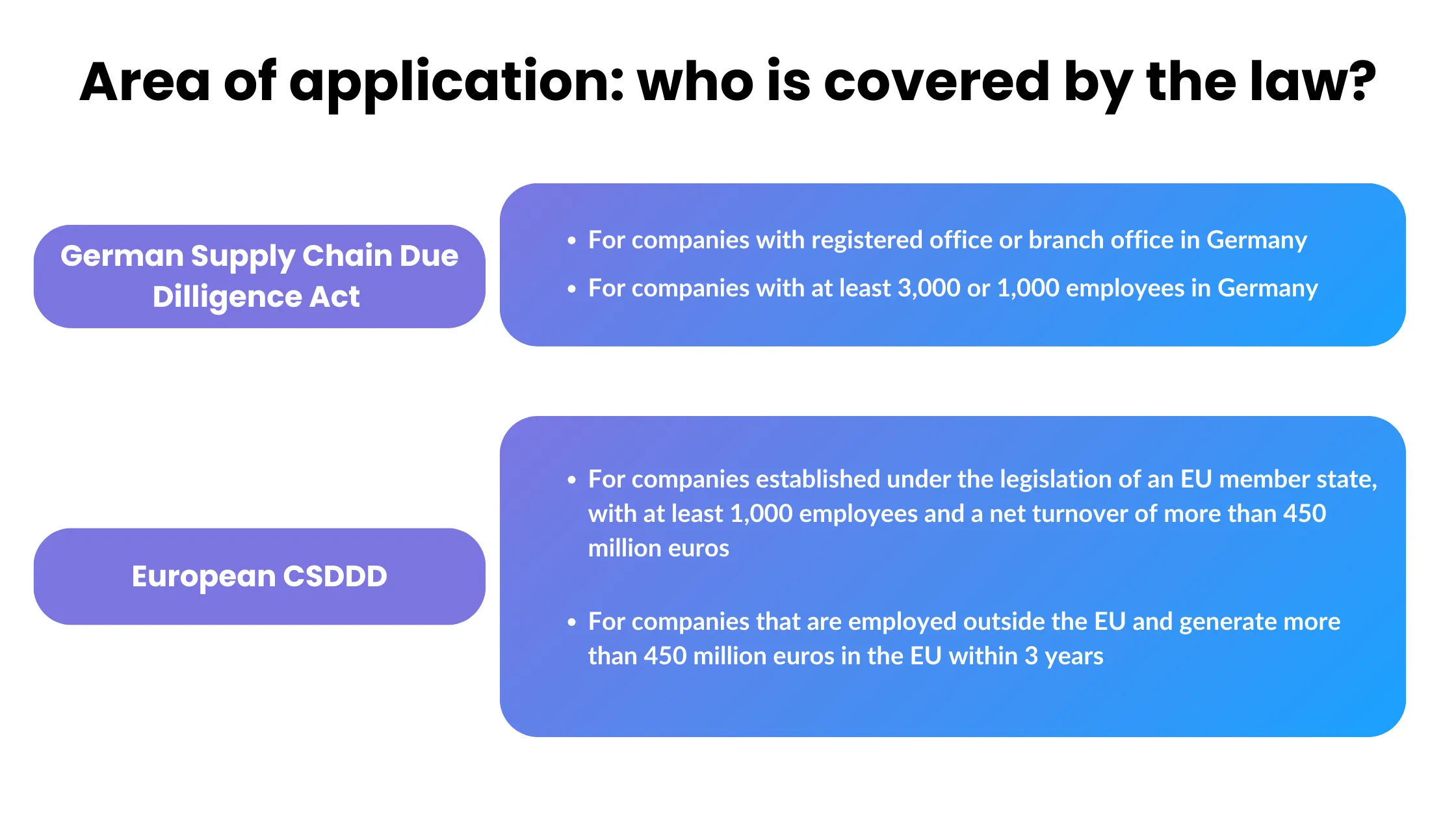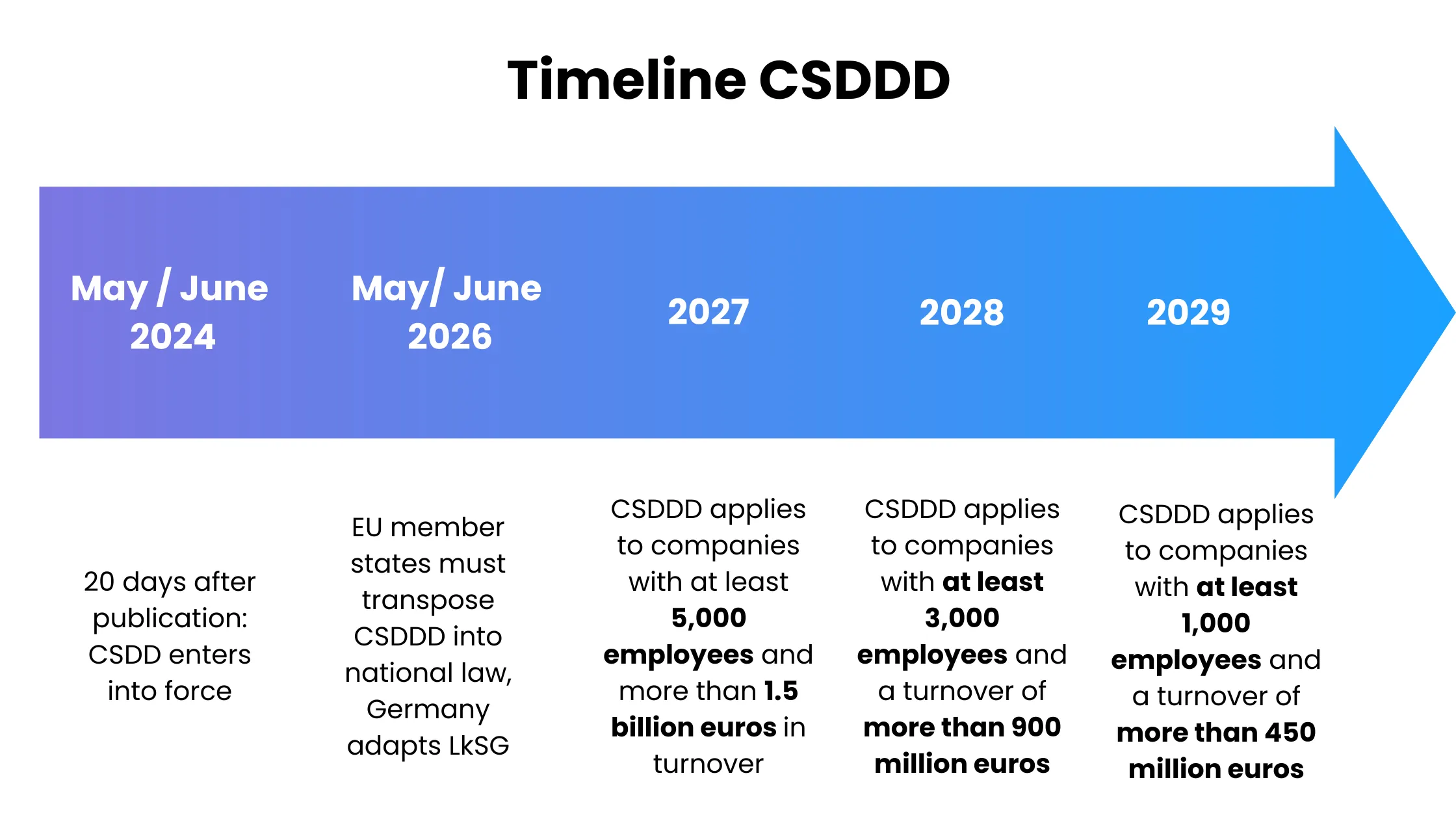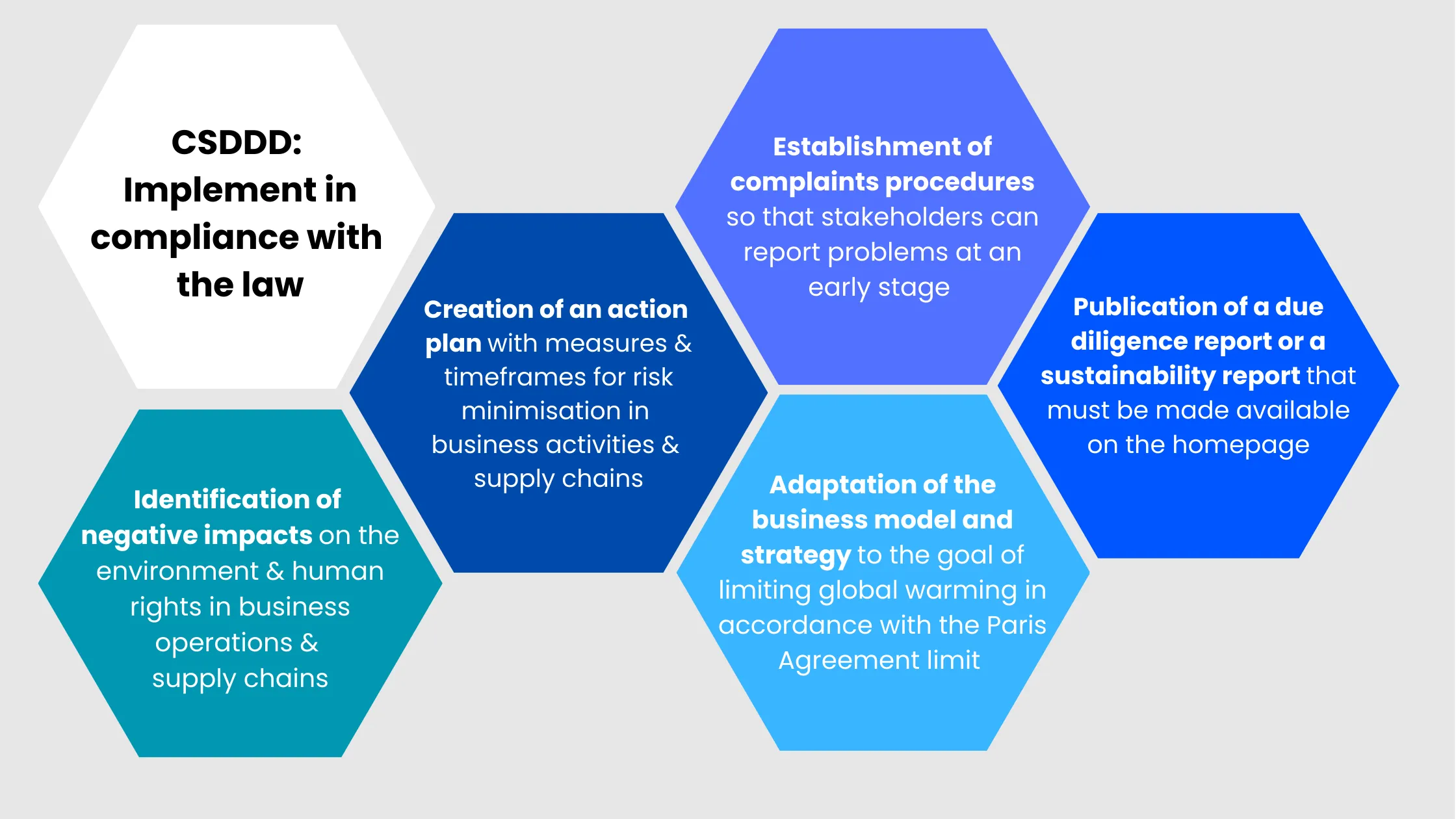CSDDD for companies: The most important aspects of the EU law
Jan. 15, 2024 • Reading time: 8 Min
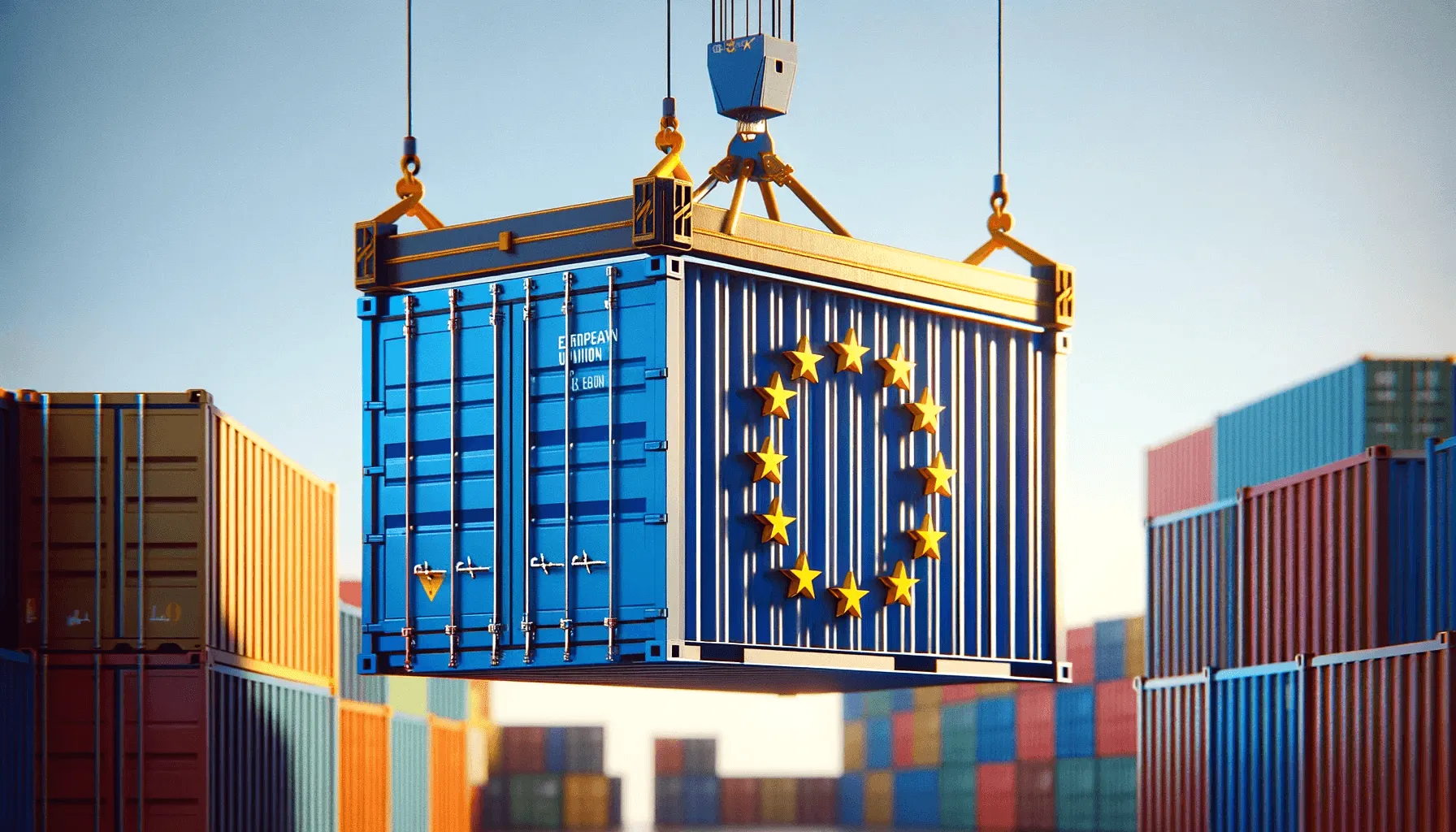
The Corporate Sustainability Due Diligence Directive (CSDDD) is part of the new EU law on supply chains that is attracting a lot of attention. This regulation requires companies to audit their supply chains to ensure that there are no human rights violations or environmental damage. Companies will soon have to prepare to meet these requirements. But what exactly does this mean? In short, companies must ensure that their suppliers and partners respect human rights and act in an environmentally friendly manner. This directive gives companies the opportunity to take responsibility and do good. In this article, we will explain the most important points of the directive in more detail. We will also explain what companies should look out for and what benefits they can derive from it.
Summary: CSDDD at a glance
The EU supply chain law, also known as the Corporate Sustainability Due Diligence Directive (CSDDD), is a European Union directive that obliges companies to check their supply chains for sustainability and ethical principles. The CSDDD has two main objectives: Firstly, companies should take responsibility for their impact on people and the environment. They must take care of the protection of human rights, the fight against child labour, environmental protection and climate protection. Secondly, the directive aims to ensure that companies comply with human rights standards along their entire supply chain and thus avoid violations of social and environmental rules.
The law applies to companies with at least 1,000 employees and a turnover of at least 450 million euros worldwide. The implementation of the CSDDD requires extensive analyses of supply and value chains as well as the identification of risks and appropriate risk mitigation measures based on this. Companies must also report transparently on their activities and prepare a due diligence report, which can be published either in a sustainability report or on the company website.
The directive presents companies with a number of challenges, such as obtaining information along their entire supply chains. Additional costs may also arise from the implementation of new processes and systems. Nevertheless, the CSDDD also offers companies opportunities to improve their image and gain consumer trust. By implementing sustainable practices, costs can be reduced in the long term.
Subscribe to never miss any insights.
Receive regular insights and updates on the latest developments in the areas of LkSG, CSDDD, CSRD, ESRS, compliance, ESG and whistleblowing. Our newsletter helps you to simplify your compliance processes.
Corporate Sustainability Due Diligence Directive: A definition
What does the directive actually mean and what are its objectives?
The CSDDD, or the EU Supply Chain Directive, is a law of the European Union and stands for"Corporate Sustainability and Due Diligence Directive". This law obliges companies to check their supply chains for sustainability and ethical principles. The aim of this directive is to protect human rights, preserve the environment and promote climate protection.
The Corporate Sustainability Due Diligence Directive has two main objectives: Firstly, companies should be obliged to take responsibility for their impact on people and the environment. This means that they must take care of the protection of human rights, the fight against child labor, environmental protection and climate protection.
Secondly, the directive aims to ensure that companies comply with human rights standards along the entire supply chain. This applies in particular to working conditions and environmental protection. In addition, the directive is intended to ensure that global value chains become more transparent and that violations of social and environmental rules are avoided.
Why is the CSDDD concept so important?
This approach is very important for our society and our planet. More and more people want to know where products come from and under what conditions they are produced. With this guideline, consumers can make better-informed decisions and align their purchasing behavior with their own values.
The concept ensures that companies in the EU take action to reduce their impact on people and the environment. They must ensure that they comply with due diligence obligations and do not cause negative consequences such as child labor, slavery, exploitation of workers or environmental pollution.
Meet the requirements of the LkSG and the CSDDD
Navigate safely through LkSG and CSDDD: Our tool supports you in complying with due diligence and sustainability requirements in your supply chain.
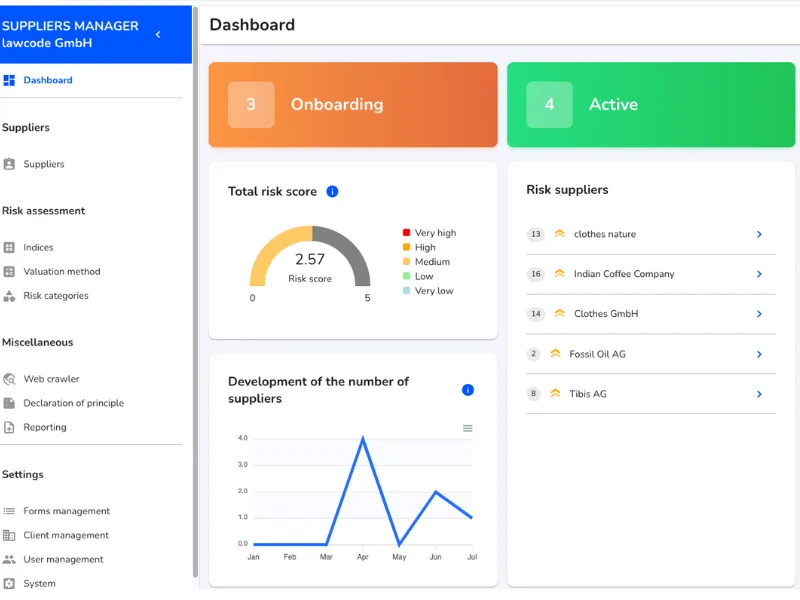
Which companies are affected?
The specific scope of the law depends on the number of employees and turnover. Originally, the first draft of the EU Supply Chain Act was intended to apply to companies with 500 or more employees and an annual turnover of more than 150 million euros. However, following failed votes, the scope of application was limited. In comparison to the German LkSG, the law now only applies to EU and foreign companies with 1,000 employees and a global net turnover of more than 450 million euros.
Companies outside the EU are also obliged to comply with the law. The regulation applies to them if they generate more than 450 million euros (previously 300 million euros) in turnover in the EU within three years of the directive coming into force. This includes companies from third countries active in the EU that meet the turnover thresholds of the groups listed above. It is important that this turnover is generated in the EU. However, it does not matter whether these organizations have branches or subsidiaries in the region. The Corporate Sustainability Due Diligence Directive therefore applies directly to EU companies and non-EU companies.
Initially, financial services are not affected by the directive, but there is a possibility that they will be included later. The EU directive has staggered transition periods: Violations could result in penalties of up to 5 percent of global turnover. Those affected, including trade unions and civil society organizations, then have five years to assert their claims.
Legislation and legal matters
The European Union introduced the Corporate Sustainability Due Diligence Directive back in March 2021. This requires companies to take active measures to protect human rights and the environment in their operations and supply chains. On February 23, 2022, a proposal for an EU-wide "Supply Chain Directive" was submitted to the EU Commission and is currently in the legislative process. The aim of the new directive is to oblige companies in the EU to respect human rights and environmental protection in global value chains in future. The draft was approved by the European Council on December 1, 2022 and adopted by the European Parliament on June 1, 2023 with a majority of 366 votes in favor to 225 against.
The European Commission, the EU Parliament and the European Council negotiated in trilogue on how the draft should be adapted before it is finally adopted. On December 14, 2023, the EU Council and the European Parliament reached a provisional agreement on the CSDDD, which now only needs to be formally approved by the Legal Affairs Committee. The final vote on the EU Supply Chain Directive took place on February 9, 2024, but the FDP of the German government coalition opposed the law. The FDP threatened that Germany would abstain from voting on the law. Italy also hesitated to approve the directive, which initially called the CSDDD into question. Other EU member states were also initially critical of the draft, which meant there was a risk that a majority would not be reached. As a result, the vote was postponed at short notice. Thanks to the mediation of the Belgian Council President, a compromise was reached and the previous draft of the EU Supply Chain Directive was watered down somewhat:
- Reduced scope of application: The scope of application now includes companies with 1,000 employees (instead of 500) and a turnover of at least EUR 450 million (instead of EUR 150 million)
- The high-risk sector approach has been removed: The concept of gradual inclusion of companies that do not meet the scope criteria but operate in high-risk sectors has been abandoned.
- Fewer requirements for the textile and food sectors: The new draft law also removes additional regulations for companies in the textile and food production sectors.
- Gradual application introduced according to company size and turnover
EU Supply Chain Directive finally adopted
On Friday, 15.03.2024, there was another vote on the directive. As announced, Germany abstained. However, the representatives of the other EU member states adopted the directive with a qualified majority: the EU Supply Chain Act has been passed.
MEPs in the EU Parliament also voted in favor of the EU Supply Chain Act on 24.04.2024 with 374 votes in favour and 235 against. The next step is for the 27 EU member states to approve the law, but this is considered a formality. The law is expected to be published in May / June 2024 and enter into force 20 days after publication. The EU member states must then transpose the CSDDD into national law within 2 years. In Germany, this is likely to be done by amending the LkSG.
In Germany, the Supply Chain Due Diligence Act has been in force since January 1, 2023. It is expected to be amended by the end of 2025 in accordance with the Corporate Sustainability Due Diligence Directive. The directive affects companies in EU and non-EU countries that are active in the EU. In contrast to previous national due diligence laws, the Directive takes a more comprehensive and binding approach to sustainable business practices in the EU. Despite the weakening of certain aspects, the new regulations will go beyond the German Supply Chain Act.
Find out more about the LkSG? Here you can access the sections of the law on corporate due diligence to prevent human rights violations in supply chains.
Timetable: What happens now
After the directive comes into force, national laws have certain deadlines to implement it:
- May / June 2024: 20 days after its publication, the CSDDD comes into force
- May / June 2026 (2 years after entry into force): EU member states must transpose the CSDDD into national law, Germany will adapt the LkSG
- 2027 (3 years after entry into force): CSDDD applies to companies with at least 5,000 employees and a turnover of at least 1.5 billion euros.
- 2028 (4 years after entry into force): Directive applies to companies with more than 3,000 employees and a turnover of at least 900 million euros.
- 2029 (5 years after entry into force): CSDDD applies to companies with more than 1,000 employees and a turnover of at least 450 million euros.
On the road to sustainability: key aspects of the directive for companies
Key aspects for the legally compliant implementation of the European Supply Chain Directive (CSDDD) by companies are:
- Identification of the greatest negative impacts on the environment and human rights in its business activities, subsidiaries and supply chains.
- Creation of an action plan with concrete measures and timeframes for risk reduction in business activities and supply chains.
- Establishment of complaints procedures so that employees and interest groups can report problems at an early stage and solutions can be developed.
- Adaptation of the business model and business strategy to the goal of limiting global warming to 1.5°C in accordance with the Paris Agreement. This particularly affects larger companies.
- Publication of a due diligence report or an accountability report on due diligence. This information can be provided either in a sustainability report or on the company website.
The implementation of the Corporate Sustainability Due Diligence Directive requires companies to analyze their supply and value chains, identify risks, take appropriate risk mitigation measures and report on them. The aim is to promote responsible business practices and comply with human rights, social and environmental standards. This is to be ensured through increased accountability to investors, customers and society.
Companies must pay attention to this
In order to act in an ethically and environmentally responsible manner, companies must pay attention to various things in their supply chain. It is important to recognize the risks in the supply chain. They should pay particular attention to possible violations of human rights and environmental damage.
Appropriate measures must be taken to reduce these risks. These include, for example, cooperation with suppliers and interest groups as well as the introduction of guidelines and standards for sustainable procurement. Training and education for employees can also help to raise awareness of ethical and environmental issues.
Another important pillar in dealing with the supply chain is transparency. Companies should disclose their activities and fulfill documentation obligations in order to provide an overview of their supply chains. This can be achieved through regular reports or audits, for example.
All in all, it is important to develop a comprehensive concept for sustainable procurement. It should meet the company's own standards as well as the requirements of customers and society.
Challenges and opportunities
The Supply Chain Due Diligence Directive poses a number of problems for companies. One of the biggest difficulties is that it can be difficult for many companies to find and process all the information they need along their entire supply chains. This can be particularly challenging for complex global supply chains.
Another problem is that the implementation of the Corporate Sustainability Due Diligence Directive can mean additional costs for companies. Introducing new processes and systems, training employees and carrying out regular audits all require investment. This can be a burden, especially for small and medium-sized companies.
Nevertheless, the directive also offers opportunities for companies and society. By implementing measures to promote sustainable supply chains, companies can improve their image and gain the trust of consumers. They can also save costs in the long term by using more environmentally friendly materials and methods.
The Corporate Sustainability Due Diligence Directive also affects global supply chains. As many companies operate globally, they must ensure that they meet the requirements of the directive in all countries in which they operate. This may mean that companies have to rely more on local suppliers or look for alternative procurement sources.
Overall, the Directive is a challenge for companies. At the same time, however, it also offers opportunities to improve their sustainability practices and strengthen their image. However, implementation requires careful planning and some investment in new processes and systems.
Implement the LkSG now in accordance with the law
Observe due diligence and sustainability requirements in your supply chain: implement them now with our supply chain tool.
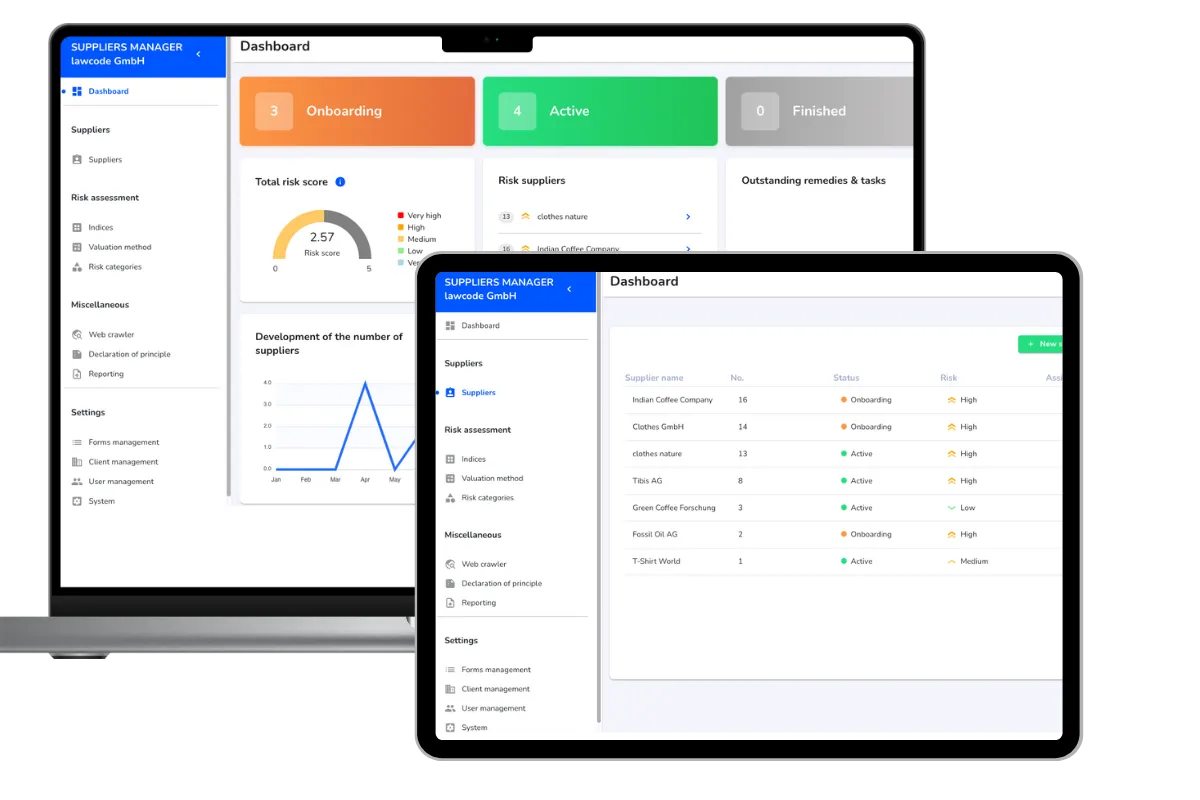
Connection with other laws
The Corporate Sustainability and Due Diligence Directive is based on similar laws in France and Germany, such as the French'loi de vigilance' and the German Supply Chain Due Diligence Act (LkSG). The Directive includes due diligence obligations with regard to environmental protection and human rights as well as the obligation for larger companies to draw up a so-called 'climate plan'.
Compared to the German LkSG, the planned directive goes even further and has significantly stricter regulations: In contrast to the limited scope of application of the LkSG, the Directive provides for a significant expansion of both the protected legal interests and the due diligence obligations. The CSDDD imposes comprehensive due diligence obligations on companies with regard to compliance with environmental and human rights requirements in their supply chains. In comparison to the LkSG, the CSDDD includes significantly stricter requirements with regard to environmental protection in particular, taking into account all measurable environmental impacts such as harmful soil changes, water or air pollution, harmful emissions, excessive water consumption and other impacts on natural resources. This represents a significant difference to the LkSG, which previously focused heavily on the protection of human rights.
The CSDDD also takes up the target of 1.5°C set out in the Paris Climate Agreement. Accordingly, companies subject to the CSDDD must develop and implement a plan on how they can contribute to achieving the climate protection target within the framework of their business model and corporate strategy ("transition plan").
Furthermore, affected companies must be prepared for new civil liabilities. The CSDDD introduces civil liability towards private individuals in the event of breaches of due diligence obligations. In addition to high fines, companies can therefore also be confronted with claims from those affected under certain circumstances. In contrast, the LkSG does not currently provide for such civil liability.
Overall, the Corporate Sustainability Due Diligence Directive therefore goes further than the German LkSG and thus offers greater potential for improving working conditions, protecting the environment and achieving climate targets.
The EU Supply Chain Act for sustainable and ethical supply chains
Summary and conclusion
The EU Supply Chain Act is a directive of the European Union (European Parliament). It requires companies to check their supply chains for sustainability and ethical principles. The aims of the directive are to improve human rights, protect the environment and support international climate goals. Companies must take measures to avoid negative impacts such as child labor or environmental pollution.
The Corporate Sustainability Due Diligence Directive requires companies to review their supply chains, identify risks and report on them. It helps to improve sustainability practices, but also poses challenges. Similar to the German Supply Chain Due Diligence Act (LkSG), the European Supply Chain Directive (CSDDD) goes further and affects certain companies. It is expected to be implemented by 2025 or 2026.
The concept is important for companies and society to act sustainably. It helps to promote responsible business practices and protect people and the environment. If companies adhere to ethical and environmental standards in their supply chain, they can improve their image and gain the trust of customers, thereby retaining their loyalty. However, implementation requires good planning and some investment in new processes and systems.
